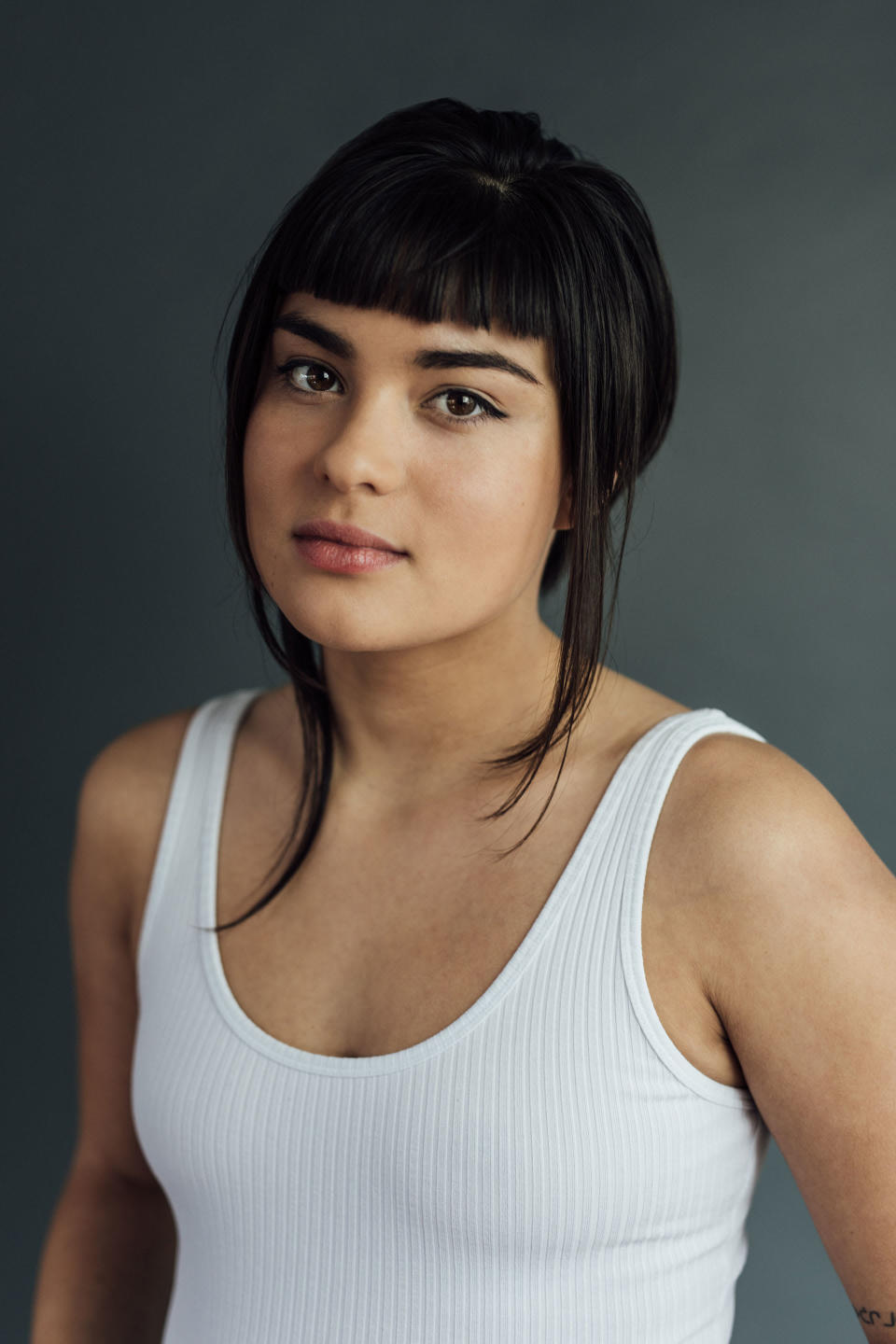'I Want to See Indigenous Action Movies': Devery Jacobs Asks Canada to Seek More Diverse Stories

Image via Kristina Ruddick
Since its inception in 2019, the MADE|NOUS movement has been spotlighting and celebrating media and content creators across Canada. This spring, their “Seek More” campaign was set in motion to advocate for more Canadian creators of diverse racial backgrounds and lived experiences in the avenues of film, television, and gaming. The goal is to further showcase the many different perspectives and experiences that exist within the country, to encourage more voices to speak out, and to keep this momentum consistent.
The recently launched campaign features six ambassadors with varied backgrounds who have shared their experiences working in the industry. Alongside actors like Shamier Anderson (Stowaway) and Simu Liu (Marvel’s upcoming Shang-Chi and the Legend of the Ten Rings), the impressive roster includes multi-talented queer artist Devery Jacobs (Blood Quantum, Taika Waititi/FX’s Reservation Dogs). Jacobs, who was born and raised in the Kanien’kehá:ka Mohawk Territory in Quebec, has been actively advocating for Indigenous and LGBTQ2+ rights. Jacobs’ career took off with a Canadian Screen Award-nominated performance in Rhymes for Young Ghouls in 2013, and she has since continued to make her mark as an actor, writer, director, and activist. Her feature-length directorial debut, The Place, is currently in development.
As an ambassador for Seek More, Jacobs is determined to use her voice to break stereotypes and walls that she had to face along the way throughout her career. “It’s a matter of us collectively coming together in order to confront this issue of misrepresentation and lack of representation,” says Jacobs in her Seek More campaign video. She emphasizes the importance of Indigenous creators being included in the entire process of telling their own stories. “So often we’ve only seen tragic Indigenous stories on screen—but what about funny stories, love stories, or dramatic stories not based in tragedy? Those should be brought to the screen and celebrated too.”
We caught up with Devery Jacobs to further discuss the campaign and her experience as a queer Indigenous actor working in Canada.
Firstly, congratulations on an accomplished career, and thank you for using your voice to make an impactful change. An initiative like Seek More, which celebrates and opens doors for BIPOC Canadian creators in media, is extremely valuable. This is an important fight in an industry that has historically struggled with representation. What does it mean to you to be directly involved with this project, and what do you hope to see come out of it?
It means so much to be a part of the Seek More campaign, especially alongside artists I admire so much. For me, it’s important to not only dismantle the current systemically racist system, but to re-imagine an industry that is truly inclusive and what that can look like.
Yes, shifting both perspectives and dynamics are both necessary. You’ve been working in film and television since you were a young girl. How was your experience growing up and coming up in the film and television industry?
Growing up in Kahnawake, and as an Anglophone Mohawk kid in Quebec, I thought acting would never be a possibility, let alone as a stable career. Indigenous people just weren’t in the media. I ended up going to school to be a counsellor, and pursued that path—until I was cast in my first leading role, in Jeff Barnaby’s Rhymes for Young Ghouls. Until that moment, I had never foreseen a future for myself with acting, despite loving it so thoroughly. From that moment on, I knew that I couldn’t do anything else with my life.
“The industry may be treating diversity as if it’s a fad that will soon pass—but we will prove that BIPOC stories are valid and that we are here to stay.”
And you’ve since only continued to bless the world with your talent, and your voice. As we enter the early years of a new decade, have you seen significant developments being made in the film and television industry? How does an initiative like MADE | NOUS expedite progress?
I think the biggest change I’ve seen with this overdue push for diverse stories and inclusion is seeing more BIPOC creatives behind-the-camera—this still doesn’t mean it’s enough. And that’s where I think initiatives like MADE | NOUS are effective—we can seek and demand for change in the film industry.

Agreed, and it’s so important to show people their own power. You’ve already successfully established yourself over a 14-year-old career. Even as you gained more success and notoriety, you’ve mentioned there are still times you have felt boxed in or typecasted. What opportunities would you like to see more of for yourself and other Indigenous actors?
What I’m hoping to see are funding bodies granting Indigenous projects bigger budgets—I want to see Indigenous action movies and high-calibre projects. That means that producers and executives in positions of power will need to take a chance on emerging BIPOC talent, which is exactly what I hope to see more of in the future.
What do you think would inspire more BIPOC creatives to produce and share their stories?
Tell the stories you need and want to see on screen. The industry may be treating diversity as if it’s a fad that will soon pass—but we will prove that BIPOC stories are valid and that we are here to stay.
Absolutely, the good fight continues on. What advice do you have for Indigenous youth who aspire to become professional creatives, and for BIPOC folx who want to get involved with the MADE | NOUS initiative?
My advice for Indigenous youth pursuing a career in the creative arts is to be brave and to be bold. Oftentimes we’ll be the only Indigenous person in the room, and it’s sometimes easier to make ourselves small—we need to fight that feeling. Stand tall and proud in our culture and know that we come from entire communities of beautiful storytellers. For BIPOC folks who want to get involved with the MADE | NOUS initiative; I would recommend that you reach out to them on social media, and follow their accounts. Watch Canadian content and tag them in posts mentioning your favourite homegrown projects—they also have countless recommendations of incredible BIPOC films coming out of this country.
Related Articles
Stephan James & Shamier Anderson Are Coming Through for Black Canadian Talent
How Mobilize Is Fighting for Indigenous Representation Through Streetwear
'Blood Quantum,' a Canadian Indigenous Zombie Film, Is Too Timely
More Complex
Sign up for the Complex Newsletter for breaking news, events, and unique stories.
Follow Complex on: Facebook, Twitter, Instagram, YouTube, Snapchat, TikTok

